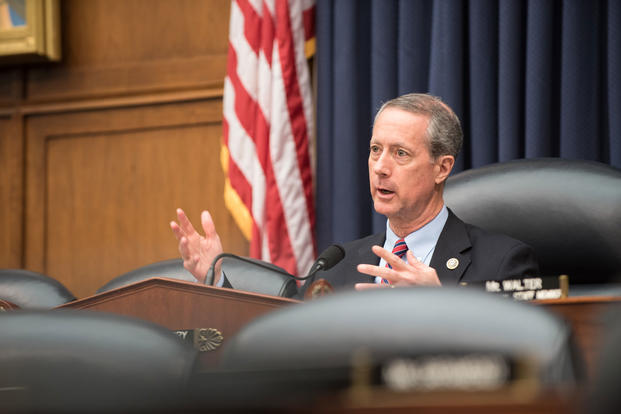An internal Pentagon memo from last March that instructed military commands to lay off detailed descriptions of military needs caused consternation not only within the press corps but also among congressional leaders.
The chairman of the House Armed Services Committee told reporters Tuesday that he and Defense Secretary Jim Mattis have had several conversations on the topic of transparency with the press and public, and he continued a "back-and-forth" with the Pentagon over the issue.
"There are two legitimate concerns," Rep. Mac Thornberry, a Texas Republican, said during a briefing in Washington, D.C. "One concern that he is focused on is, you don't want to tell your adversaries your problems. The concern that I tend to focus on is how do we fix our problems. And there's a natural tension about how much you can say publicly."
The March 2 memo, sent by Pentagon spokesman Navy Capt. Jeff Davis, passed along Mattis' warning to avoid "telegraphing readiness shortfalls" to adversaries, explaining that doing so "invites miscalculation."
Davis continued that elected leaders were already aware of the needs of the military.
"They don't need news stories to remind them," he wrote. "Help is on the way."
When inviting press to ships or units, he said, strength must always be projected.
A similar memo from Chief of Naval Operations Adm. John Richardson, sent March 1, warned service officials to avoid talking about operational capabilities in specifics.
Now more than ever, it is important that public communication about our forces, their operations, and their capabilities, even at the unclassified level, makes it easier for potential adversaries to gain an advantage," he wrote. "Scrutinize information and protect it."
Some leaders have already spoken out publicly about the move to limit information flow out of the military.
Rep. Mike Gallagher, a Marine veteran and member of the House Armed Services Committee, told an audience at the Surface Navy Association's annual symposium near Washington, D.C., last week that the Navy’s lack of information sharing could damage efforts to build back strength.
"If the bias is toward silence to prevent adversaries from finding out about unique capabilities or potential weaknesses -- guess what, there will never be a public constituency for acquiring or mitigating them," Gallagher wrote in prepared remarks, according to Defense News. "And, oh by the way, our adversaries probably have a decent idea of what we're up to anyways."
Richardson told reporters at the same event that the aim of his memo wasn't to stop talking [but] be careful what we talk about."
Thornberry said Mattis has been clear that lawmakers should be fully briefed in classified sessions. But for him, the issue of communication with the public goes beyond acquisition strategy.
"You can't hide the fact that we had 17 sailors die, or how many Marines in the aircraft that exploded," he said, referring to two tragic ship collisions last summer and a July 10 KC-130 crash that left 16 dead.
"And I think that those families need to know that we are going to fix those problems. ... We'll kind of have this back-and-forth that will continue, but I'm on the side that we need to talk more about these issues."
-- Hope Hodge Seck can be reached at hope.seck@military.com. Follow her on Twitter at @HopeSeck.












